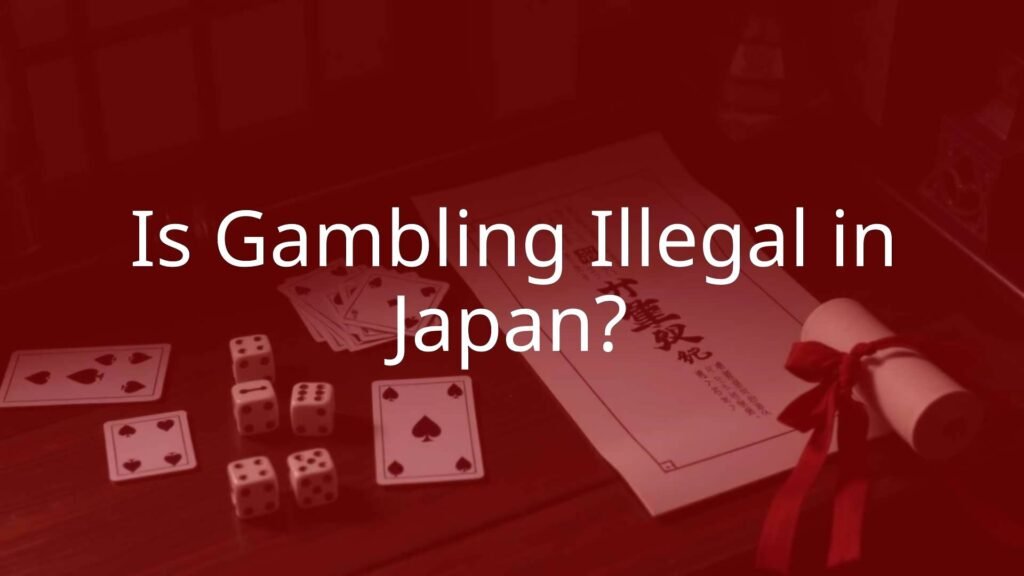Gambling laws in Japan are quite strict. Generally, most types of gambling are banned by Chapter 23 of the Criminal Code. However, the government does allow some gambling activities under special regulations. These exceptions are there mainly to raise money for national and local governments and offer some entertainment. Strict rules are in place for legal gambling, showing Japan’s long tradition of keeping betting under control, which goes back hundreds of years.
The law against private gambling goes back to 1907 when the Penal Code made most forms of gambling illegal. While the government rarely changes this approach, it does allow some games. To understand gambling laws in Japan, you need to know which activities are legal, why they are allowed, and what the government does to balance economic benefits with problems like gambling addiction.

Is Gambling Illegal in Japan?
Gambling in Japan is largely banned under the Criminal Code. Still, there are a few important exceptions where betting is allowed but closely watched by the government. So, while gambling is mostly illegal, there are specific cases-like lottery, certain sports betting, and Pachinko-where it is legally permitted and regulated. This setup is unique to Japan, blending parts of gambling into everyday life, but banning most other forms.
This approach comes from Japan’s history and culture, combining the government’s need to control gambling with concerns about its risks. The government keeps a close watch on legal gambling to make sure money benefits the public and rules are followed.
What Does Japan’s Criminal Code Say About Gambling?
Japan’s Criminal Code (Chapter 23) clearly bans most gambling activities. It describes gambling as “when two or more people bet on the outcome of a game of chance” to win money or something else valuable. Even if skill is involved, if chance matters a lot, it is counted as gambling.
Article 185 says anyone caught gambling illegally can be fined up to ¥500,000. Repeat offenders can be sent to prison. Setting up a private gambling place is treated as a serious crime, with sentences from at least three months up to five years in jail. These laws are strict to stop illegal betting and the problems it brings.

Which Gambling Activities Are Allowed by Law?
Even though the overall rule is a ban, some types of gambling are legal in Japan. These include public sports betting, certain lottery games, and the game Pachinko. Each is highly regulated with the main goals of raising public funds and providing limited entertainment.
The government sees these exceptions as “short-term fun” or lower-risk activities, not meant to create big gambling problems. Each activity can only be run by the government or approved local organizations, and the profits must go to public use. Licenses are only given to trusted operators to keep operations clean and clear.
What Types of Legal Gambling Exist in Japan?
Japan’s legal gambling choices are few and tightly controlled. The kinds that are allowed follow careful structures meant to support government budgets and give entertainment in a way that reduces risks. These legal gambling forms bring in large amounts of money, showing their importance to the country’s economy.
From busy horse tracks, to lottery ticket stands, to the buzzing sound of Pachinko halls, each game appeals to different people. In all approved gambling, government control is clear and strong, unlike banned types that are chased by police.

| Legal Gambling Type | Description | Regulation |
|---|---|---|
| Public Sports Betting (Kōei Kyōgi) | Horse, bicycle, boat, and motorcycle racing | Government-licensed, parimutuel system |
| Lottery Games (Takarakuji) | Draws, scratch cards, sports lottery | Operated by local governments |
| Pachinko | Pinball-style machines in arcades | Supervised, with indirect cash payouts |
Public Sports Betting (Kōei Kyōgi)
Kōei Kyōgi means “public gambling,” and covers just four legal betting sports in Japan. These legally allowed races are run by local governments or state-backed firms. All betting runs on a parimutuel (pool-based) system, and a portion of sales supports the government and the sport.
Tickets for these events are sold in many places, and betting on these races makes up a big part of legal gambling in Japan. Tight controls are in place to keep these games clean and to block illegal influence.
Horse Racing (Keiba)
Horse racing (Keiba) is the biggest legal betting sport in Japan. Its roots go back to the 1800s. Now, the Japan Racing Association runs thousands of races a year at many tracks. Punters can bet on flat races, jump events, and even Ban’ei Racing-unique to Hokkaido, with horses pulling sleds.
Horse betting is very popular, with easy guides available for beginners. In 2022, it pulled in ¥3.25 trillion, showing how huge an industry it is.
Bicycle Racing (Keirin)
Keirin is a special kind of track cycling made for gambling, starting in 1948. Races are held in velodromes and attract both local and international attention. The sport became an Olympic event in 2000.
The Japan Keirin Autorace (JKA) Foundation runs the sport and keeps betting fair. There are several bet types, such as picking the winner (Trifecta) or placing bets on the top finishers (Quinella Place). Keirin betting made up ¥1.09 trillion in 2022.
Boat Racing (Kyōtei)
Boat racing (Kyōtei), using hydroplanes, began in Japan in 1952 and is fast-paced. Each race features six drivers racing for less than a minute. Bettors can choose from several bet options. Stadiums run up to a dozen races daily, with bets placed on-site or at special outlets.
Boat racing brought in ¥2.44 trillion in 2022. Advertising is common. Each bet has a standard fee and a minimum spend to keep things controlled.
Motorcycle Racing (Ōtorēsu)
Ōtorēsu is a form of flat-track motorcycle racing. Eight racers compete in each event. Safety rules are stricter nowadays after older versions were banned. Races can be Handicap (with slower riders set ahead) or all start equally. It’s the least popular among public betting sports, with a turnover of ¥107.5 billion in 2022. Riders often live in special dorms to stop cheating.
Lottery Games (Takarakuji)
Takarakuji are lotteries run by local governments, mainly to raise money for public projects and charities. Lottery booths are found all over Japanese cities.
There are three main types: single-number lotteries, pick-your-number games, and scratch cards. Tickets cost between 100-500 yen, and big prizes can be over 100 million yen. Law requires prize money to be under half the ticket sales. There’s also a sports lottery (Toto) that lets people bet on soccer results.
Pachinko and Pachislot
Pachinko is a slot and pinball-style game run in dedicated parlors all over Japan. While not officially classed as gambling, it works like it. Pachinko parlors are private businesses, and the industry is huge, making ¥2.58 trillion in 2022.
Winners get more balls, which they exchange for prizes at the parlor. To get cash, these prizes-like gold tokens-are swapped for money at a nearby shop. Since the cash isn’t handed out on parlor grounds, they avoid breaking the gambling law. Even though addiction is a worry, Pachinko remains a key part of Japanese leisure.

Are Casinos Legal in Japan?
For a long time, Japan didn’t allow casinos. That changed with the Integrated Resort (IR) laws in 2015 and 2018, which allow casinos in big resort complexes. Stand-alone casinos are still banned; only those in special IR resorts are allowed, mainly to bring in tourists.
This change was hotly debated, especially over its effects on society and addiction. The government has put in many restrictions and checks to try to manage these concerns.
The Integrated Resort (IR) Initiative
The IR plan allows casino gambling only as part of large resorts with hotels, conference centers, and attractions. The main goal is to boost tourism and the economy. The IR law, passed in 2018, first allowed up to three resorts, possibly in cities like Osaka, Tokyo, and Yokohama. Osaka was the first to invite proposals and gave MGM Resorts the contract for its IR.
The project has sparked controversy, especially about possible social effects. Supporters hope IRs will attract international visitors and spark business events. The setup takes ideas from places like Singapore, where casino resorts draw many tourists.

Casino Administration and Regulation
With IRs now legal, strict government control is needed. There are new rules and agencies to keep everything in line.
Casino Regulatory Committee
The Casino Administration Committee (sometimes called the Japanese Casino Regulatory Committee, or JCRC) began in January 2020. This independent group oversees IR operators, making sure they stick to the law. Jobs include giving and taking away casino licenses, investigating companies, and checking that rules are followed for licensing, security, daily operations, and customer safety. All people involved in running a casino go through background and financial checks to prevent cheating or organized crime.
Timeline for Casino Legalization and Development
The plan for casinos took years of political work. Momentum picked up in 2015 with the IR Enabling Act, then moved ahead with the IR Implementation Law in 2018. Since then, businesses have fought for the rights to build the first resorts. Osaka won approval in April 2023, with MGM’s mega-resort expected to break ground in 2025 and open in 2029, including hotel rooms, a casino, shops, restaurants, and meeting spaces. For now, Osaka leads the way, and the government could allow more IRs later.
What Are the Rules for Online Gambling in Japan?
The rise of the internet has created new challenges for Japanese gambling laws. While real-world gambling is tightly controlled, the situation online is different. Japan says that online gambling is mostly illegal, no matter if the companies are based in Japan or abroad.
The government wants to avoid unregulated internet betting, but enforcing these rules is hard because the web crosses borders. Even so, many Japanese people gamble online illegally every year, and this has become a big underground business.
Is Online Gambling Permitted?
No, regular online gambling isn’t legal in Japan. The Penal Code of 1907 bans both real and digital gambling, unless allowed by special law. The new casino laws permit land-based gaming only, not online casinos. This was confirmed by leading government officials.
The only lawful online betting options are those officially offered by the government-such as horse racing and other legal races. Lotteries can also be bought online. All other online casinos, especially overseas ones, are illegal. Still, people continue to play on foreign sites, and the total illegal online bets top ¥1 trillion each year.
Legal Risks for Online Players and Operators
Anyone taking part in online gambling in Japan faces legal trouble. Using overseas casino sites from within Japan can mean fines or arrest. Running an online gambling service for Japanese customers can result in charges for running a gambling site, with tough penalties, even prison.
Police have been increasing crackdowns since 2023, arresting site operators and some players. The government plans to bring in a new law in 2025 to stop illegal online gambling, ban advertising for online casinos, and inform people about the dangers and consequences of breaking the law.
How Is Illegal Gambling Addressed in Japan?
Even with tight laws, illegal gambling continues in Japan, often helped along by criminal groups. Police work hard to find and stop these games, which include both underground casinos and online gambling.
Punishments for illegal gambling are severe, underlining how serious the government is about stopping unapproved betting and its negative effects.
Common Types of Illegal Gambling
Aside from the legal games, there are several common illegal types. These include secret casinos, where traditional games like cards or roulette are played, and unlawful Mahjong parlors where cash is wagered. Many of these are hidden to avoid detection.
Illegal online gambling is also a problem. Many Japanese use foreign gambling sites that use aggressive marketing. These sites often start with free games to attract users before pushing real-money betting. The convenience of the internet makes it hard for police to shut these operations down.
Gambling Penalties and Law Enforcement
Japan’s Penal Code sets out clear punishment for lawbreakers. Illegal gamblers can face up to ¥500,000 in fines, and those who run illegal gambling places can be jailed for three months to five years. Selling fake lottery tickets or acting as a middleman also draws heavy penalties.
The National Police Agency is active in fighting illegal betting, including busts on underground casinos and illegal betting rings. Both operators and players are targeted. The government also requires campaigns to warn the public about the risks and legal problems associated with gambling illegally.
High-Profile Legal Cases in Japan
Many news stories show how illegal gambling is an ongoing problem. In 2021, nearly 400 people were caught using illegal machines. In 2023, a group running a long-term gambling ring in Tokyo was arrested.
There have also been major scandals, like the case of politician Tsukasa Akimoto, who was jailed for taking bribes from a foreign casino operator. These stories highlight problems of illegal betting and how important it is for authorities to act.
Links to Organized Crime (Yakuza)
Japanese mafia groups-known as Yakuza-have long been involved in illegal gambling, running underground casinos and loan operations. While membership numbers are down compared to past decades, they still earn large incomes from gambling, debt collection, and other illegal trade.
Authorities regularly raid Yakuza-linked operations. In 2020, a top gang leader was arrested for running an illegal Baccarat game in Tokyo. Efforts to stop illegal betting are closely tied to fighting organized crime overall.

Frequently Asked Questions about Gambling Laws in Japan
Because Japan’s gambling laws can be tricky, here are clear answers to common questions about who can gamble, taxes, and future changes.
| Question | Answer |
|---|---|
| What is the legal age for gambling? | 20 for public sports betting and casinos. Pachinko is 18+, but high school students can’t play-even if they are 18. |
| Can tourists play at Japanese casinos? | Yes, tourists will be able to gamble once the new IR casinos open. Tourists will need ID; locals face extra rules like entrance fees and visit limits. |
| Are gambling winnings taxed? | Yes. Usually, big winnings count as income and are taxed by the government. Casino operators pay a 30% tax rate on their earnings. Players with major prizes should check their tax requirements. |
| Are gambling laws in Japan changing? | Yes. IR casinos are coming, and a new law in 2025 is planned to better control illegal online gambling and promote public awareness. Locals will face limits on casino visits to avoid addiction, and casino entry will include a fee. |
These ongoing changes show that Japan is trying to balance the financial benefits of gambling with the need to protect its citizens from gambling-related harm.
- What Is a Maiko? - July 13, 2025
- What Does Domo Arigato Mean? - July 12, 2025
- What Does Naruto Mean? - July 12, 2025









